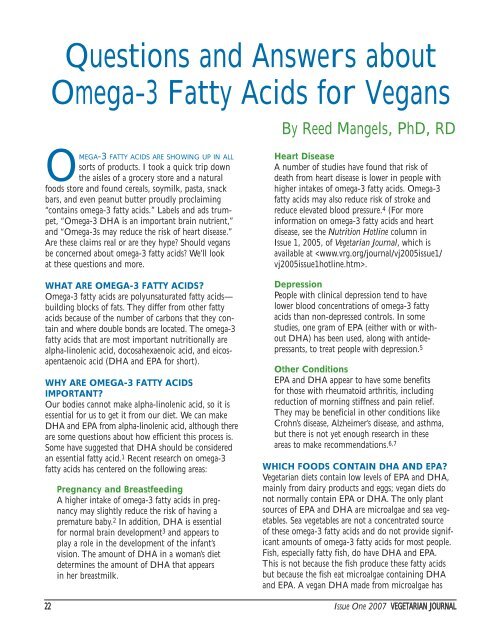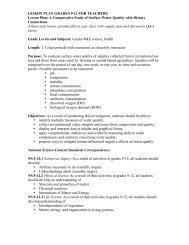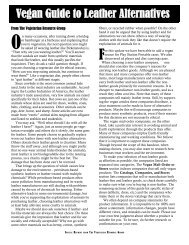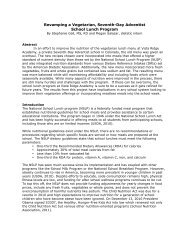Vegan Thickeners - The Vegetarian Resource Group
Vegan Thickeners - The Vegetarian Resource Group
Vegan Thickeners - The Vegetarian Resource Group
You also want an ePaper? Increase the reach of your titles
YUMPU automatically turns print PDFs into web optimized ePapers that Google loves.
Questions and Answers about<br />
Omega-3 Fatty Acids for <strong>Vegan</strong>s<br />
By Reed Mangels, PhD, RD<br />
OMEGA-3 FATTY ACIDS ARE SHOWING UP IN ALL<br />
sorts of products. I took a quick trip down<br />
the aisles of a grocery store and a natural<br />
foods store and found cereals, soymilk, pasta, snack<br />
bars, and even peanut butter proudly proclaiming<br />
“contains omega-3 fatty acids.” Labels and ads trumpet,<br />
“Omega-3 DHA is an important brain nutrient,”<br />
and “Omega-3s may reduce the risk of heart disease.”<br />
Are these claims real or are they hype? Should vegans<br />
be concerned about omega-3 fatty acids? We’ll look<br />
at these questions and more.<br />
WHAT ARE OMEGA-3 FATTY ACIDS?<br />
Omega-3 fatty acids are polyunsaturated fatty acids—<br />
building blocks of fats. <strong>The</strong>y differ from other fatty<br />
acids because of the number of carbons that they contain<br />
and where double bonds are located. <strong>The</strong> omega-3<br />
fatty acids that are most important nutritionally are<br />
alpha-linolenic acid, docosahexaenoic acid, and eicosapentaenoic<br />
acid (DHA and EPA for short).<br />
WHY ARE OMEGA-3 FATTY ACIDS<br />
IMPORTANT?<br />
Our bodies cannot make alpha-linolenic acid, so it is<br />
essential for us to get it from our diet. We can make<br />
DHA and EPA from alpha-linolenic acid, although there<br />
are some questions about how efficient this process is.<br />
Some have suggested that DHA should be considered<br />
an essential fatty acid. 1 Recent research on omega-3<br />
fatty acids has centered on the following areas:<br />
Pregnancy and Breastfeeding<br />
A higher intake of omega-3 fatty acids in pregnancy<br />
may slightly reduce the risk of having a<br />
premature baby. 2 In addition, DHA is essential<br />
for normal brain development 3 and appears to<br />
play a role in the development of the infant’s<br />
vision. <strong>The</strong> amount of DHA in a woman’s diet<br />
determines the amount of DHA that appears<br />
in her breastmilk.<br />
Heart Disease<br />
A number of studies have found that risk of<br />
death from heart disease is lower in people with<br />
higher intakes of omega-3 fatty acids. Omega-3<br />
fatty acids may also reduce risk of stroke and<br />
reduce elevated blood pressure. 4 (For more<br />
information on omega-3 fatty acids and heart<br />
disease, see the Nutrition Hotline column in<br />
Issue 1, 2005, of <strong>Vegetarian</strong> Journal, which is<br />
available at .<br />
Depression<br />
People with clinical depression tend to have<br />
lower blood concentrations of omega-3 fatty<br />
acids than non-depressed controls. In some<br />
studies, one gram of EPA (either with or without<br />
DHA) has been used, along with antidepressants,<br />
to treat people with depression. 5<br />
Other Conditions<br />
EPA and DHA appear to have some benefits<br />
for those with rheumatoid arthritis, including<br />
reduction of morning stiffness and pain relief.<br />
<strong>The</strong>y may be beneficial in other conditions like<br />
Crohn’s disease, Alzheimer’s disease, and asthma,<br />
but there is not yet enough research in these<br />
areas to make recommendations. 6,7<br />
WHICH FOODS CONTAIN DHA AND EPA?<br />
<strong>Vegetarian</strong> diets contain low levels of EPA and DHA,<br />
mainly from dairy products and eggs; vegan diets do<br />
not normally contain EPA or DHA. <strong>The</strong> only plant<br />
sources of EPA and DHA are microalgae and sea vegetables.<br />
Sea vegetables are not a concentrated source<br />
of these omega-3 fatty acids and do not provide significant<br />
amounts of omega-3 fatty acids for most people.<br />
Fish, especially fatty fish, do have DHA and EPA.<br />
This is not because the fish produce these fatty acids<br />
but because the fish eat microalgae containing DHA<br />
and EPA. A vegan DHA made from microalgae has<br />
22 Issue One 2007 VEGETARIAN JOURNAL

















